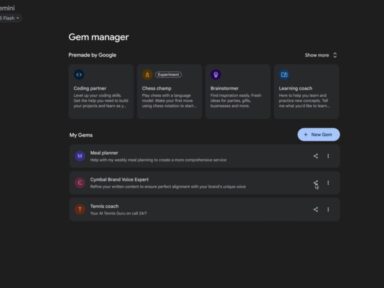• The new functionality enables Claude to directly edit files rather than just providing instructions, making it significantly more useful for office productivity tasks
• Users can now upload Excel files and have Claude analyze data, create charts, fix formulas, and reorganize information without having to implement changes manually
• This feature puts Claude ahead of competitors like ChatGPT in terms of direct document manipulation capabilities
• The update is currently available to Claude Pro and Team subscribers, with broader availability expected soon
In a significant leap forward for AI assistants, Anthropic has unveiled a game-changing update for Claude that dramatically enhances its office productivity capabilities. The AI chatbot can now directly create, edit, and manipulate spreadsheets and documents, making it a substantially more powerful tool for workplace tasks than many of its competitors.
This update represents a critical evolution in how AI assistants interact with our documents – moving beyond simply providing instructions to actually implementing changes. For anyone who’s ever wished their AI assistant could just “do it for them” instead of explaining how to do it, Claude’s new capabilities are a welcome advancement.
How Claude’s New Document Capabilities Work
Claude’s new document manipulation abilities allow it to work directly with files you upload. Rather than just analyzing a spreadsheet and telling you what to change, Claude can now make those changes itself, saving significant time and reducing the potential for errors in manual implementation.
The update enables Claude to perform a wide range of document-related tasks. For spreadsheets, it can analyze data, create charts and visualizations, fix broken formulas, reorganize information, and even generate entirely new spreadsheets based on your requirements. With text documents, Claude can edit content, restructure information, format text, and create new documents from scratch.
This functionality addresses one of the most frustrating limitations of current AI assistants – their inability to directly modify files. Previously, if you wanted Claude to help with a spreadsheet, you’d need to implement all its suggestions manually. Now, Claude handles the implementation, making it genuinely useful for complex document tasks.
How Claude Compares to Other AI Assistants
This update positions Claude ahead of many competitors in terms of direct document interaction. While ChatGPT can analyze spreadsheets and provide recommendations, it can’t yet directly manipulate files in the same way Claude now can. Google’s Gemini offers some document integration within Google’s ecosystem, but Claude’s approach appears more flexible and comprehensive.
The ability to not just understand but actually modify documents represents a significant competitive advantage for Anthropic. It transforms Claude from an advisor into an active collaborator that can implement changes rather than just suggest them.
Jack Soslow, Anthropic’s product lead, emphasized this distinction in a statement about the update: “We’re excited to help people get more done with Claude. Document editing is a natural extension of Claude’s capabilities – making Claude more helpful by allowing it to take action on your behalf rather than just telling you what to do.”
The update also demonstrates Anthropic’s focus on practical, workplace-oriented features rather than just conversational abilities. While many AI developers have focused on making their assistants more knowledgeable or conversational, Anthropic is clearly prioritizing functional capabilities that save users time and effort.
Availability and Future Implications
Currently, these new document capabilities are available to Claude Pro and Team subscribers, with Anthropic indicating that broader availability is planned. The feature supports Excel (.xlsx) files initially, with plans to expand to other document formats in the future.
This update has significant implications for how AI assistants may evolve in workplace settings. By directly manipulating documents, Claude is becoming more than just an advisor – it’s becoming an active participant in workflows. This could potentially reshape how teams collaborate with AI tools and how office productivity evolves.
For businesses, the ability to have an AI assistant that can not just analyze but actively improve documents could lead to significant efficiency gains. Tasks that previously required manual implementation of AI suggestions can now be completed more quickly and with less human intervention.
As other AI developers observe Claude’s approach, we’ll likely see similar capabilities emerge across competing platforms. This could accelerate the transition of AI assistants from conversational tools to active workplace collaborators capable of directly contributing to document-based tasks.
What new capabilities does Claude AI have with documents?
Claude can now directly create, edit, and manipulate spreadsheets and documents rather than just providing instructions. It can analyze data, create charts, fix formulas, reorganize information, and even generate new spreadsheets or documents based on user requirements.
How is this different from what other AI assistants can do?
While other AI assistants like ChatGPT can analyze documents and provide recommendations, Claude now has the ability to directly implement changes to files, which most competitors cannot do. This makes Claude more of an active collaborator rather than just an advisor.
Which file formats does Claude currently support?
Currently, Claude supports Excel (.xlsx) files, with plans to expand to other document formats in the future.
Who has access to these new document capabilities?
The new document editing features are currently available to Claude Pro and Team subscribers. Anthropic has indicated that broader availability is planned for the future.
How might this change how people use AI in the workplace?
This update could transform how teams collaborate with AI tools by making AI assistants active participants in workflows rather than just advisors. Tasks that previously required manual implementation of AI suggestions can now be completed more directly, potentially leading to significant efficiency gains in document-based work.
Will Claude be able to edit other types of files in the future?
Yes, Anthropic has indicated that they plan to expand Claude’s document capabilities to support additional file formats beyond Excel spreadsheets in the future.
Does this raise any privacy concerns about document handling?
As with any AI tool that processes documents, users should be aware of their organization’s data policies. Anthropic has privacy measures in place, but users should ensure that sharing documents with Claude complies with their company’s security guidelines and data governance policies.
















How would you rate Claude AI Productivity Update: 5 Powerful New Office Features Launched?